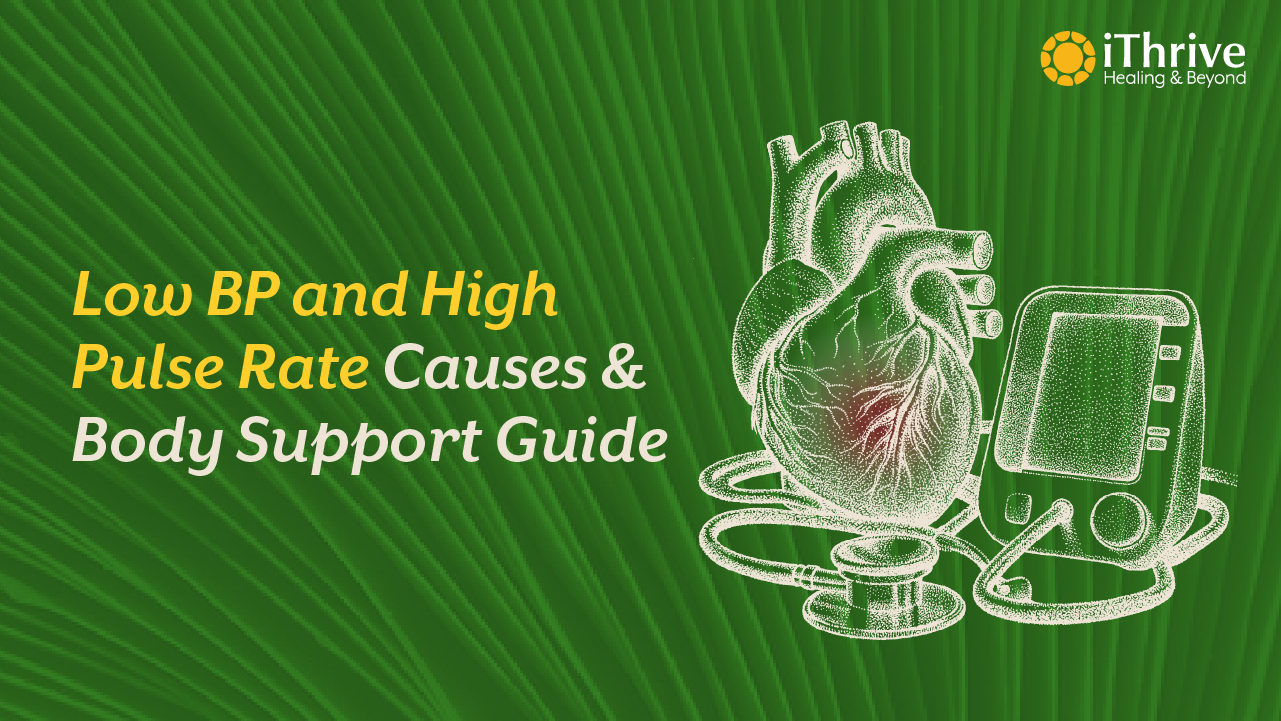With bright lights, laughter everywhere, music playing, and heavenly-smelling kitchens, Indian festivals are a vibe. Food is the heart of the celebration, whether it's Ganesh Chaturthi, Navratri, Diwali, Eid, Christmas, or a wedding season get-together.
It’s that time of the year when even the most disciplined among us find ourselves thinking, “Oh, it’s the festival… I’ll get back to healthy eating later.” And before we know it, “later” quietly slips into next year.
It's not wrong to eat festive food. Actually, it contributes to the specialness of celebrations. But in between the endless trays of pakoras, the boxes of laddoos, and the "just one more" gulab jamun, we frequently develop eating patterns that make us feel sluggish, exhausted, or bloated.
We say: To stay healthy, you don't have to give up Christmas cake, malpuas, or modaks. All you need is a little mindfulness and balance.
Top 5 eating errors that everyone makes during festivals
.webp)
1. Consuming too much sugar
Your aunt shows up with her well-known kaju katli. A box of gulab jamuns is a gift from a neighbor. The dessert table at the evening party is piled high with rasgullas, jalebis, and laddoos. You think "It's only once a year!"
But those "just one more" moments soon mount up. Your blood sugar levels spike when you consume refined sugar, and they quickly plummet again. And all of this causes sluggishness, mood fluctuations, and craving for sugar. This cycle may also raise your risk of type 2 diabetes and insulin resistance over time.
Why this happens
Sweets are more than just treats in our culture; they are representations of wealth, blessings, and community. Saying no frequently equates to saying no to the celebration. Furthermore, once you start consuming refined sugar, it becomes very difficult to stop because of its addictive nature.
Better Choice:
- Enjoy your favorite sweet, but be mindful of portion size.
- Pair it with protein or healthy fats to slow sugar absorption.
- Explore healthier options like laddoos made with dates, figs, or raw honey.
- Practice the one plate rule, take what you love most, enjoy it slowly, and skip the rest.
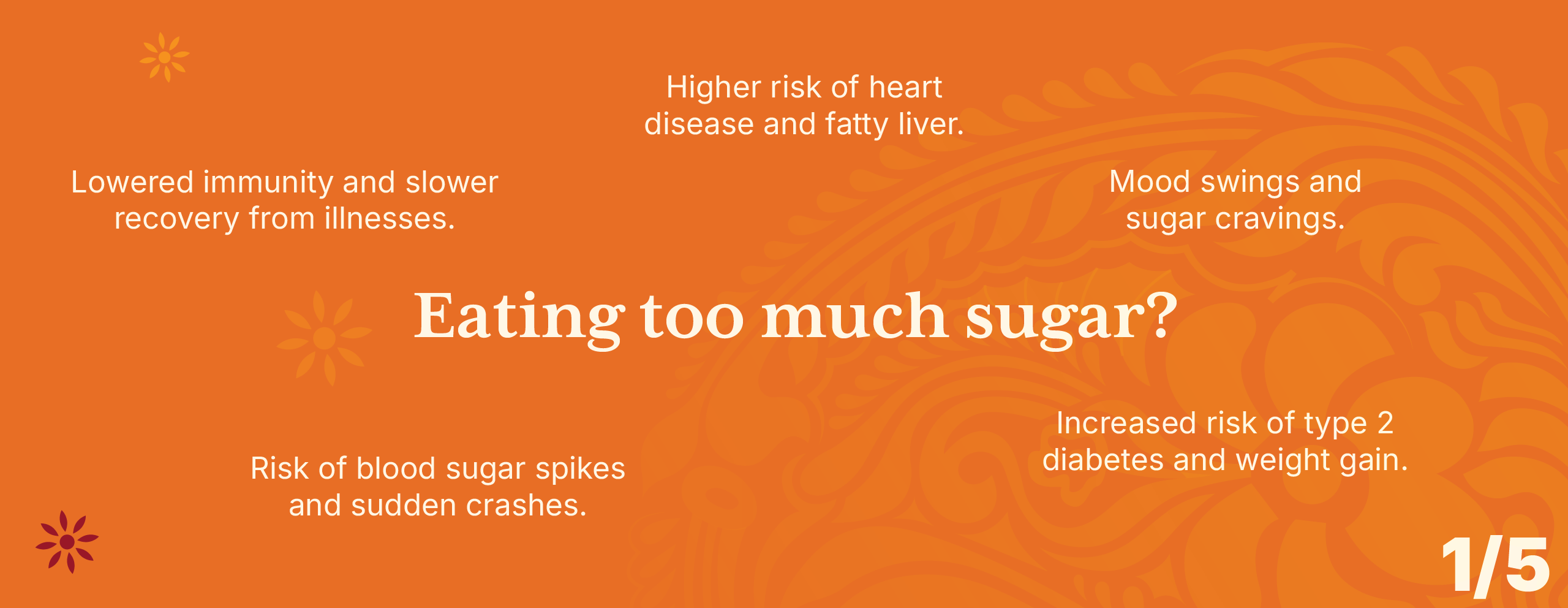
Want healthy, festive dessert options? Try iThrive's recipes like
for all the sweetness, minus the guilt! Browse more at iThrive's healthy dessert recipes.
2. Consuming Fried Foods Back-to-back
In the afternoon, a plate of crispy samosas is served first, followed by a round of hot pakoras in the evening, and for dinner, soft, fluffy puris. Many people eat the leftover bhaturas for breakfast, believing it to be a delicious way to start the day. Of course, they are delicious. However, your stomach may not be as excited.
Fried foods can be hard on your digestive tract and are high in unhealthy fats, which can lead to inflammation, acidity, and bloating. Your body doesn't get the much-needed respite it needs to process and recuperate from such a heavy food load when you eat them repeatedly.
Why it occurs:
Fried snacks are popular because they're easy to make, everyone enjoys them, and they're great for entertaining. They are also regarded as an expression of friendliness and warmth during festivals, which is why hosts frequently overdo it and serve them whenever possible.
Better Choice:
- Add roasted, baked, or air-fried snacks to mix things up.
- Try baked mathris, roasted chana, or grilled kebabs if you're entertaining.
- To aid in digestion, serve fried foods with fresh vegetables or salads high in fiber.
- Eat them occasionally rather than at every meal.
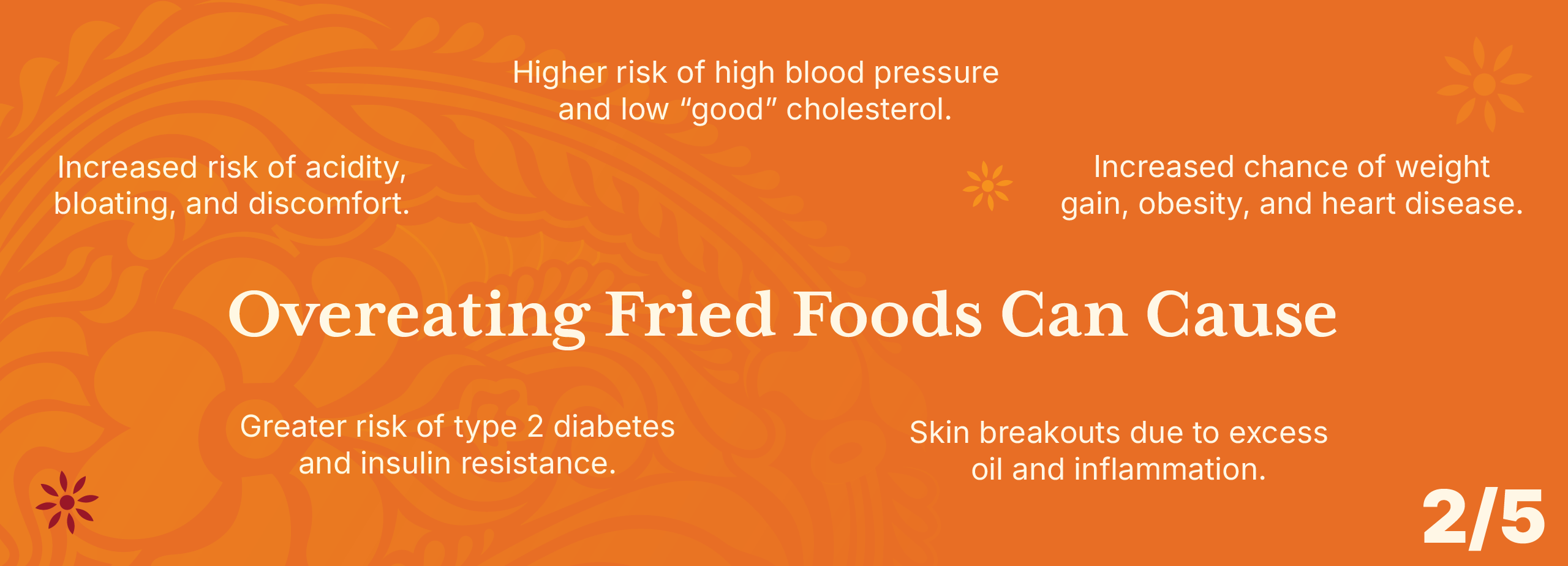
Looking for tasty snacks? Check out iThrive’s Healthy snack recpies
For crunchy, satisfying options made the healthy way!
3. Ignoring Meals to "Create Room" for Feasting
This evening, you have a large family dinner scheduled. "I'll save my calories for later," you decide, skipping breakfast and lunch. But when the time comes, you're so hungry that you stuff your plate and eat more quickly than your body can tell you're done.
Blood sugar dips brought on by missing meals can make you agitated and more prone to overeating. Additionally, when you suddenly eat a big, heavy meal, your digestive system struggles his leads to fast eating, which will lead to flatulence and bloating as food is not properly chewed.
Why it occurs
We believe it to be a clever strategy to "balance" our indulgence. Festivals are hectic, and sometimes we truly forget to eat until the main event because we are too busy decorating, shopping, and hosting.
Better Option:
- Eat smaller portions of rice and dal, fruits, or soups throughout the day and chew slowly.
- Your pre-party meal should contain some protein to keep you full without making you feel bloated.
If your body were a guest, you wouldn't starve them and then stuff them with too much food all at once.
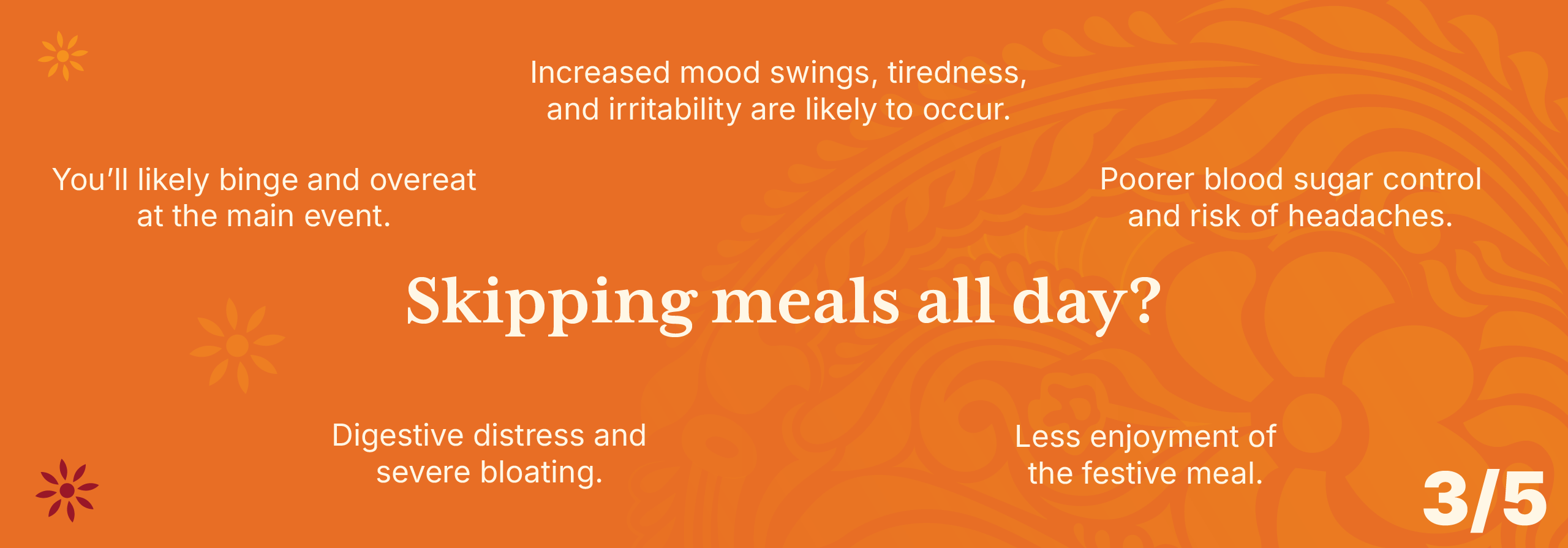
Try iThrive’s high-protein and light meals like
For simple, nourishing options to keep your energy stable through the day!
4. Ignoring Portion Control
A lot of the time, festivals feel like an unlimited buffet. The options are countless and incredibly alluring, ranging from rich main courses to snacks and sweets. You tell yourself you'll just "take a small portion of everything" as you begin with a plate that is piled high. However, because you were unable to taste some of the dishes, you eventually find yourself on round two (or three). You wish you had slowed down by the end because you're uncomfortably full.
Bloating, acidity, heaviness, and the post-meal sluggishness that makes you want to lie down rather than enjoy the celebrations are all symptoms of overtaxing your digestive system, which has its limitations. Regular overeating can also put a burden on your blood sugar and metabolism.
Why It Occurs:
When there is a lot of food available, our brains are programmed to crave "just one more bite." Food variety is exciting. Furthermore, it can be considered rude in many families and cultures to refuse food, so we continue to eat even when our bellies are already full in order to please our hosts.
Better Option:
- You can always return for more if you start with tiny portions.
- To make your brain believe that less is sufficient, use a smaller plate.
- Halfway through your meal, take a moment to see if you're still hungry.
- Keep in mind that tasting something is not the same as consuming an entire portion.
- Avoid having water in between the meals.
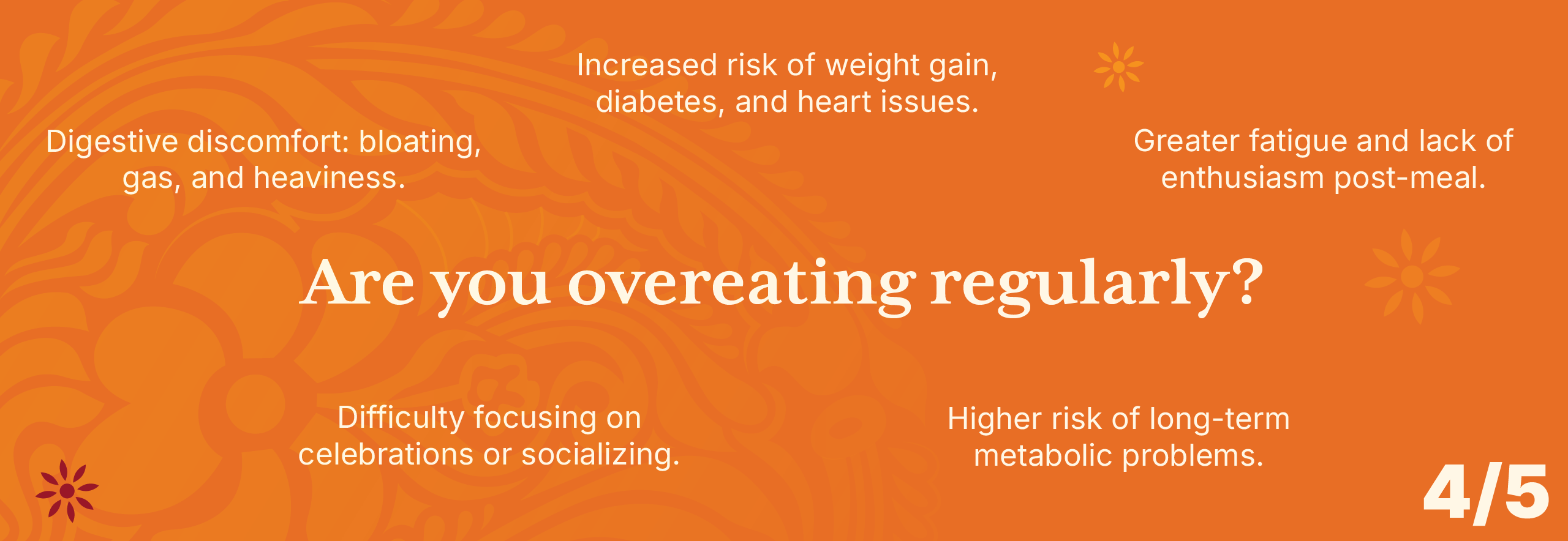
Want portion-friendly, healthy dishes? Explore iThrive’s filling, healthy recipes.
5. Ignoring Hydration
It is easy to forget to drink water amid the festivities. Before you know it, you've gone the entire day without drinking a good glass of water because you're too busy chatting to relatives, lighting diyas, serving visitors, or dancing to music. Instead, you've probably had a couple of glasses of sherbet, cups of chai, or even cocktails, none of which hydrated you.
Although dehydration is barely noticeable, it may have a big influence on your emotions. It causes headaches, inhibits digestion, and leaves you feeling tired when you should be enthusiastic. Bloating, tiredness, sometimes migraine, and that "drained" sensation during the festivities exacerbate when mixed with salty foods or drink.
Why It Occurs:
Water doesn't seem as exciting as all the other drinks available at festivals, which are full of distractions. Additionally, thirst signals frequently go unnoticed until your body is already depleted due to the excitement and bustle of the moment.
Better Option:
- Always have a bottle of water on hand and take frequent sips.
- Water should be substituted for sugary or alcoholic beverages.
- For a cool, detox-friendly choice, try herbal teas, infused water or water with lemon and mint.
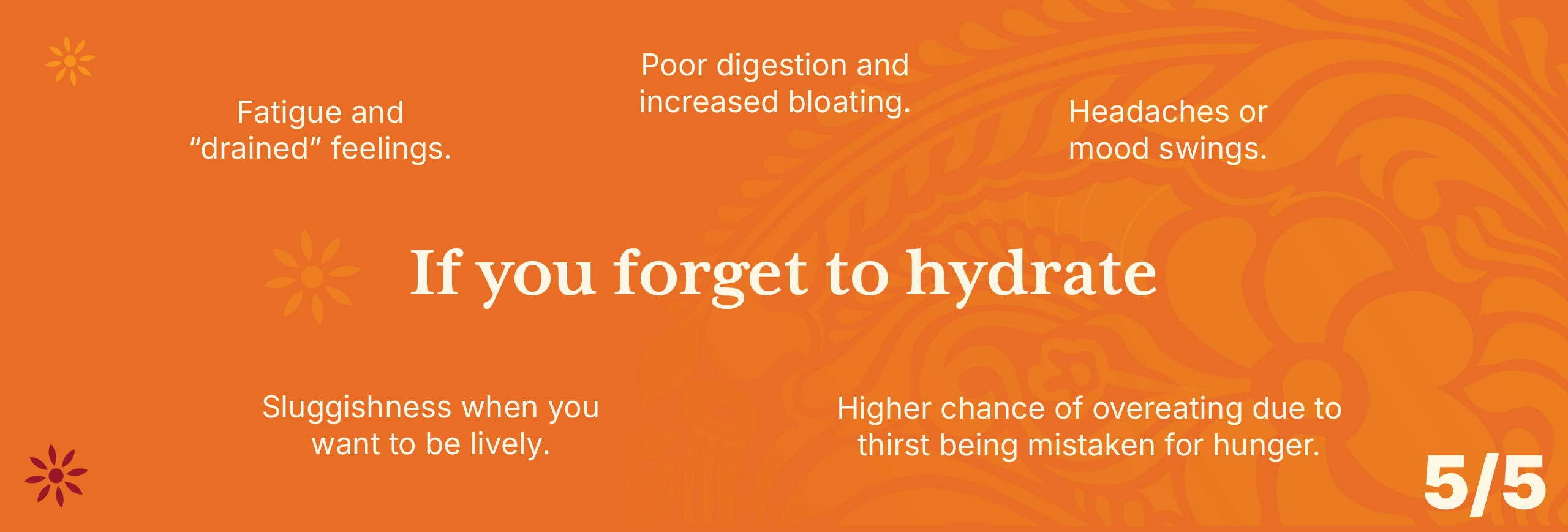
Don’t forget to try iThrive’s refreshing drinks
Bonus Festive Eating Tips to Keep You Feeling Great
- Get the day started correctly: Start with a healthy breakfast; make it protein and fat-rich that is light but well-balanced.
- Get some exercise: Even a quick 15-minute stroll after meals can aid in digestion and avoid a groggy, drowsy feeling.
- Regardless of how appetizing the food may appear, pay attention to your body and stop eating if you feel full.
- Avoid combining too many high-nutrient foods at once; doing so can help you avoid digestive issues.
- Make thoughtful substitutions: Whenever feasible, use natural sweeteners instead of white sugar, whole grains instead of refined flour, and ghee instead of refined oils and avoid gluten.
Conclusion
If you are dealing with chronic health issues like diabetes, thyroid imbalances, digestive disorders, or persistent fatigue, know that there’s a way to naturally heal your disease. We recommend: don’t just focus on symptoms, but try to truly understand what is happening inside your body. That’s exactly what our approach is about: identifying core imbalances and guiding you to real, sustainable health. If you want to talk to us about your journey, do book a free consultation with our team. We’re here to help you heal, not just manage symptoms.
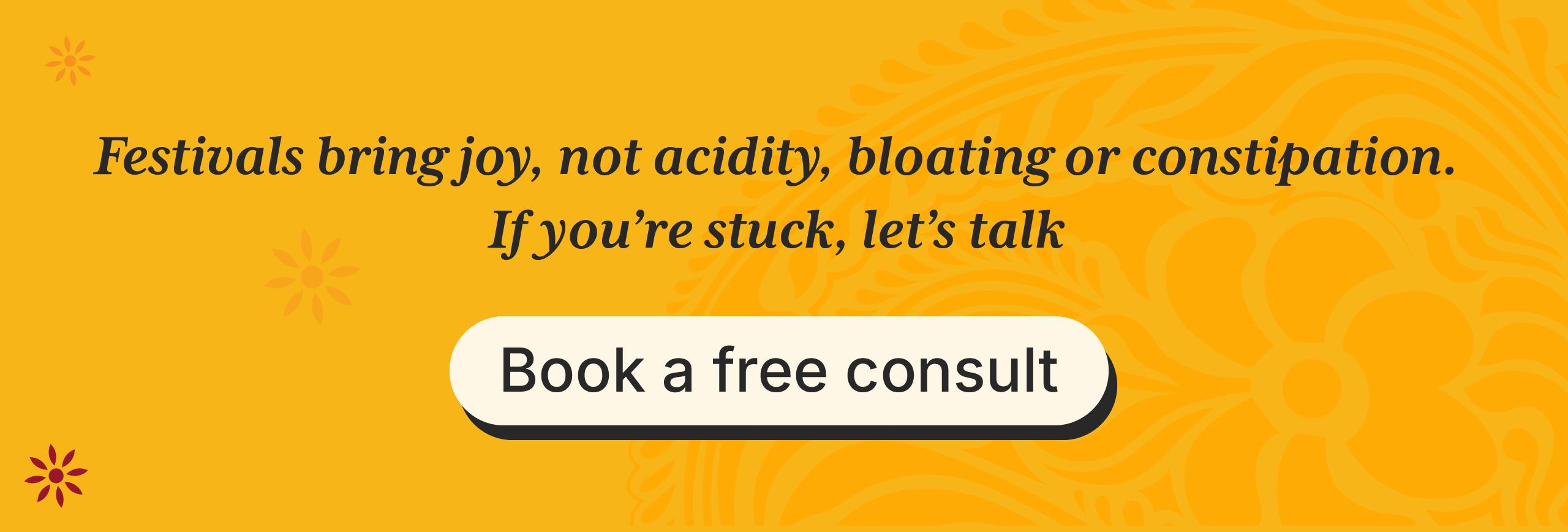
Subscribe to our newsletter and receive a selection of cool articles every week




.png)


.webp)

.jpg)
.jpg)





